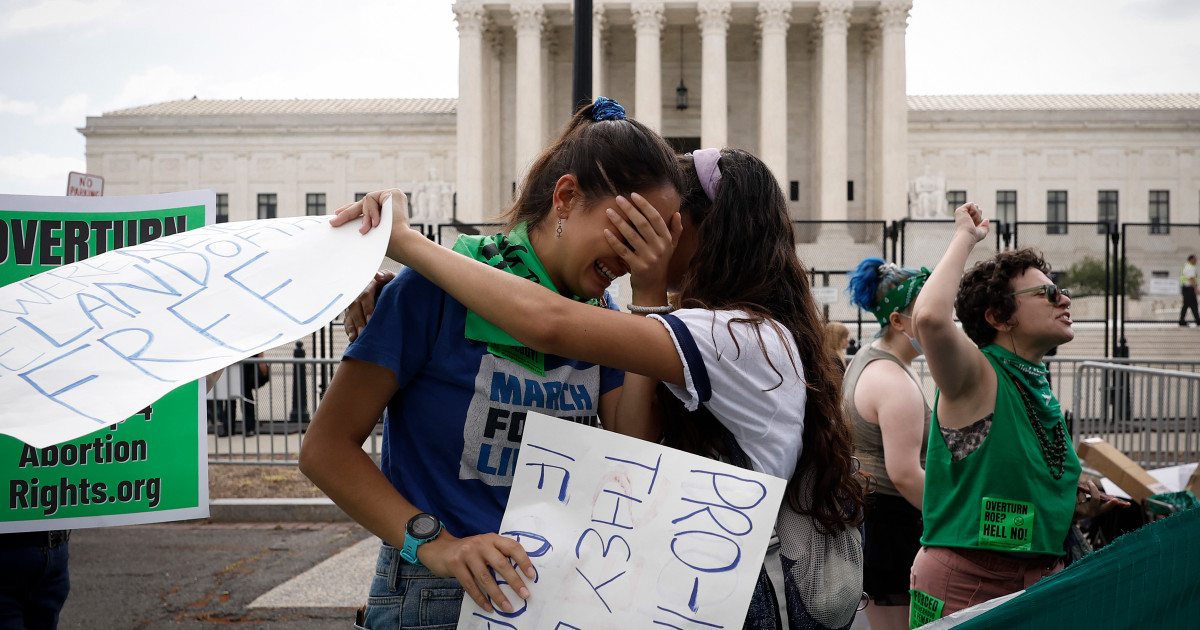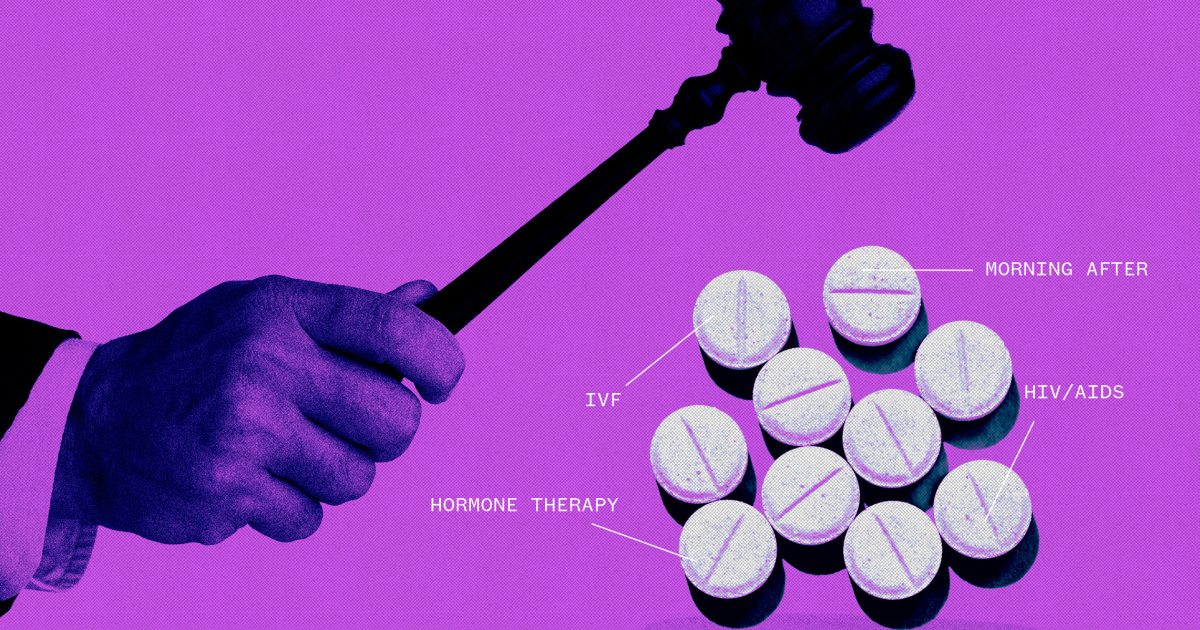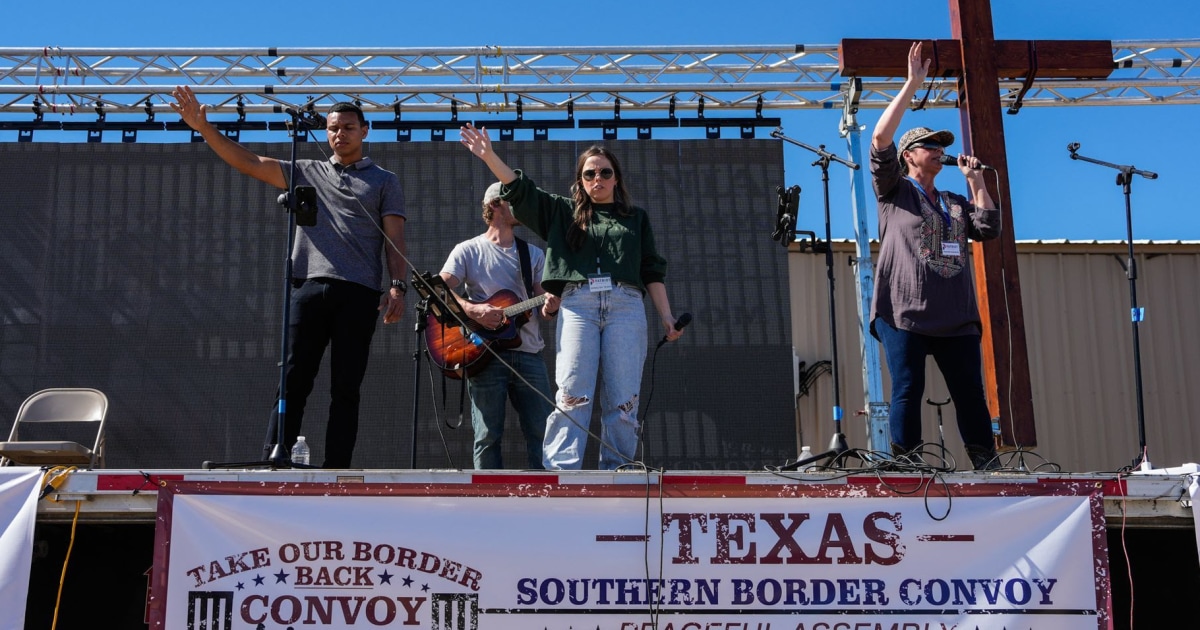In June of this year, the Supreme Court overturned the
Roe v.
Wade
and with it the constitutional right to obtain an abortion.
No group has suffered more from the negative consequences of this ruling than Latinas.
A new study from the University of California Los Angeles (UCLA) details how restricting the reproductive rights of women in the United States disproportionately affects Hispanic women, since a greater portion of them are of reproductive age than women of other races or ethnic groups, because more of them are moving or emigrating to states that most restrict abortion rights, and because more women of reproductive age in those states are Latinas than non-Hispanic white women.
Abortion rights activists Carrie McDonald and Soraya Bata react to the Dobbs v.
Jackson quashing the landmark abortion case Roe v.
Wade, in front of the Supreme Court on June 24, 2022 in Washington, DC.Anna Moneymaker/Getty Images
This also disproportionately affects LGBT (transgender men and non-binary) Latinos and Latinas who also need abortions.
Latinas "are a unique and particularly young population, and in a post-
Roe v. Wade
world that means that reproductive justice will be an urgent problem that women in states that restrict abortion will suffer," Josefina Flores explained to Telemundo News Morales, Ph.D. in sociology at UCLA and lead author of the study.
[A report reveals that the states with the most restrictions on abortion suffer the highest maternal and infant mortality]
Many of these states that restrict abortion the most are in the South and Midwest, states that, with few exceptions, are not considered to be majority Latino.
But this study shows that that is changing, explains Flores: about
46% of Latinas of childbearing age live in states that restrict reproductive rights,
or more than 5 million Latinas.
These restrictions include:
The criminalization of abortion (which is punishable as a crime)
Limitations on Medical Procedures
Limitations to how health professionals and institutions provide reproductive care
Restrictions on how health insurance covers this medical care
Restrictions on how abortion-related care is funded and reimbursed
The right to abortion and the legalization of marijuana are among the ballot proposals
Nov 9, 202201:37
Previous research has shown that younger, Hispanic and black women
obtain abortions at higher rates than other women.
Compared to non-Hispanic white women, Latinas are younger, have lower socioeconomic status, have lower rates of health insurance coverage, and are less represented in legislatures and on political decision-making boards .
Before the decision that overturned
Roe v.
Wade
, Latinas already faced numerous barriers to accessing this healthcare.
Some 6.5 million Latinas ages 15 to 49 live in states with abortion restrictions, and nearly half of them live in what researchers call economic insecurity, making it even more likely that they will need an abortion and even more precarious to get one.
[Three states approve to modify their constitutions to guarantee the right to abortion]
On Latinas, these bans have had "a very big impact," Lilian Medina Romero, communications and public policy consultant for Catholics for Choice, explained to Telemundo News.
Among the states that most restrict abortion are Texas and Florida, which are also the states with the largest Latino populations in the country (40.2% and 26.8% respectively, according to the Census) and many of them are immigrants.
"Working with organizations and colleagues in Texas, you do realize that there is a constant fear," says Medina Romero, "regardless of whether or not you have documents, if you are a new person in the system, your level of confidence and security to seek health is less. If you add to that for undocumented people it is much more difficult because they do not have that access to health."
The effects: from unemployment to death
Revealing the right to abortion has already been shown to have detrimental consequences for Latina women of childbearing age, and these effects are likely to continue to grow: increases in self-induced abortions, being forced to travel to other states for an abortion, and
increases in both the risk of die during pregnancy as in unwanted pregnancies.
Latinas are more affected because, for example, they are more likely to have jobs where they are penalized if they take days off to receive this medical care.
Losing a job can have devastating consequences, which can lead to having to live on the streets or enter a cycle of generational poverty.
[Louisiana Abortion Denied to Mother Pregnant of Fetus Missing Skull: 'I Feel Like I've Just Been Thrown to the Wolves']
"Some would say, 'Well, it's not the end of the world because people can travel' to a place where they can get an abortion, like New York," says Medina Romero.
"But for Latino people that is not so easy because mobility is restricted:
if you do not have documents, moving around the country is an activity that causes fear."
Three states approve to modify their constitutions to guarantee the right to abortion
Nov 9, 202201:28
But even having documents can be very complicated, explains this Colombian living in Washington, DC "They are women, they are people, who have jobs, and usually have children: there are studies that show that those who make the decision to terminate a pregnancy usually They already have children, who take care of their home, and to get around they need a support network".
[Her 16-year-old daughter died after being denied an abortion: 'It's outrageous that her history repeats itself']
For Latinas it is also more difficult because a large number lack health insurance: more than twice as many do not (20%) compared to non-Hispanic whites (8%), according to data from the Office of Government Health Policy.
The lack of health support and not being able to access an abortion for some women can even lead to death.
One study estimated the number of pregnancy-related deaths among different groups under a hypothetical abortion ban.
It found that non-Hispanic black women would experience the highest rate of pregnancy-related deaths, followed by Latinas.
defeat the taboo
An important factor that causes Hispanics to suffer more damage from restricting abortion is that sexuality is a taboo subject in the Latino community, explains Medina Romero, because of how deeply rooted the Catholic religion is and the traditionally conservative position of the Church that He opposes abortion in all instances.
But as new polls show, there is in fact a gap between what the Church preaches, what is talked about in families, and what people believe and practice.
New data from the Public Religion Research Institute found that among Latino Catholics, 75% say abortion should be legal in most or all cases.
That's a huge jump from the 51% saying the same in 2010.
Likewise, 95% of Catholics support the use of contraceptives, although the Church is also opposed to it and this is not discussed among families, explains Medina Romero.
An important step to improve the reproductive health conditions of Latinas is for sexuality and abortion to be discussed more openly.
Other recommendations are that the right to abortion be included in state constitutions, that governments increase budgets for public health and reproductive health, and implement restrictions on misinformation about abortion.













/cloudfront-eu-central-1.images.arcpublishing.com/prisa/KMEYMJKESBAZBE4MRBAM4TGHIQ.jpg)

